E-letter No. 144: May 2015
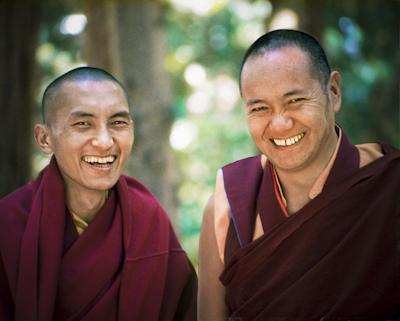
Dear LYWA friends and supporters,
Spring is finally upon us! We have much news to share with you this month, so please read on, and share this eletter far and wide.
LYWA MAKES THE DHARMA EVEN MORE ACCESSIBLE

Lama Yeshe Wisdom Archive has begun offering audio books through Audible.com! Audio books are a powerful way to make the Dharma more accessible to anyone who can understand spoken English.
Listen to experienced narrator Brian Nishii present Illuminating the Path to Enlightenment by His Holiness the Dalai Lama and Becoming Your Own Therapist / Make Your Mind An Ocean by Lama Yeshe.
You can listen to five minute audio samples of both titles and even consider enrolling in a free trial membership.
Coming up next: Audio versions of Lama Zopa Rinpoche's How Things Exist and How to Practice Dharma: Teachings on the Eight Worldly Dharmas.
30,000 FREE BOOKS COMING FOR SAKA DAWA
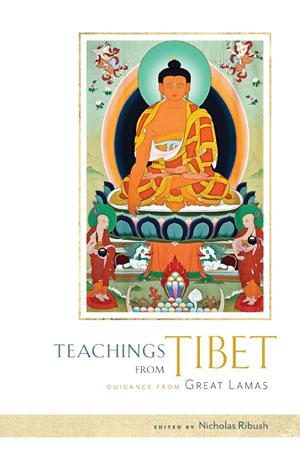
As we mentioned in our special mailing a few weeks ago, just in time for Saka Dawa, the holiest month in the Tibetan calendar, we have reprinted six of our free titles, 5,000 copies of each!
In particular we are happy to present a slightly re-edited and totally redesigned Teachings from Tibet: Guidance from Great Lamas. This book has been out of print for years and we are delighted to be able to make it available in print once again.
See our website to place your order for a print copy, and to find links to ebook vendors. If you are a member you can access ebook versions in our Members Area. Note also that we will automatically send our Members a copy of this beautiful book. Please let us know if you would prefer the ebook version, or if your address has recently changed.
Please rejoice in the publication of 30,000 more Dharma books for free distribution. This brings the total number of free books printed to nearly 700,000! Together we have made these precious teachings freely available to so many around the world.
SAKA DAWA: BUDDHA'S BIRTH, ENLIGHTENMENT, PARINIRVANA
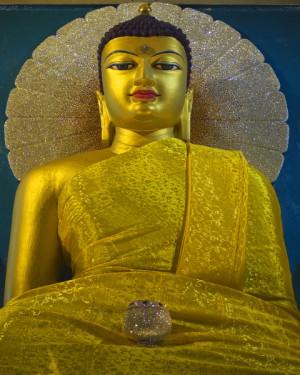
Saka Dawa, the day we commemorate the Buddha's birth, enlightenment and parinirvana, falls this year on June 2nd. This is an auspicious day for engaging in meritorious activities, such as making offerings, reciting sutras and doing practice. According to Lama Zopa Rinpoche, virtuous actions done on this day are multiplied one hundred million times.
During this merit-multiplying month of Saka Dawa, which this year runs from May 19 to June 16, we invite you to participate in the merit of making these books available by contributing to their production costs.
We also want to let you know that we have recently expanded our offerings of gifts to donors at many levels to include practice booklet PDFs and online courses from FPMT, in addition to the free books and pictures we have always offered to LYWA donors.
Now, donors of $50, $100, $250 and $500 or more will be sent an LYWA book and/or FPMT publication or course on request, and donors of $1,000 or more are offered the benefits of an LYWA Membership. See here for complete details.
Please note that if you have made a donation at any of these levels in the past year, or are already an LYWA Member, you are welcome to receive the associated gifts; please just email us to request your gift. Thank you again for incredible support over the years as together we bring the teachings of our precious Lamas to the world.
NEW VIDEO! ON THE ROAD WITH RINPOCHE
LYWA has added more wonderful new clips to our Youtube channel playlist “On the Road with Rinpoche.” This playlist features intimate and informal teachings by Rinpoche offered as he travels the world tirelessly spreading the Dharma. Watch Rinpoche instruct us on why installing walls of tsatsas in our home is so very important for accumulating the causes of happiness. And experience Rinpoche sharing his love of Tibetan with the eager students at the Tara Nunnery in Sarnath.
NEW TEACHINGS AND ADVICE ON THE WEBSITE
We have just posted a discourse given by Kyabje Lama Zopa Rinpoche in Adelaide, Australia in August 1991. In this teaching Rinpoche discusses buddha nature and the emptiness of the mind. Edited by Ven. Ailsa Cameron. See below for an excerpt of this teaching as our eletter feature below.
New advices posted this month include a response from Rinpoche to a student who wrote that hypothyroidism and food addiction had caused her to gain weight. Rinpoche advised her to stop eating sugar and meat, and also gave advice on tsog offering and purification practices she could do. Note that the student became vegetarian after receiving Rinpoche’s advice.
A student asked Rinpoche for advice regarding his diagnosis of Parkinson's disease. Rinpoche advised the student to utilize the disease on the path to enlightenment:
For a Dharma practitioner, this sickness is not a problem but a quality. Especially for those who practice thought transformation, bodhicitta, this is not a problem; it is the best thing to happen. So you can take the suffering of all sentient beings—especially those who have Parkinson’s disease—on the ego and destroy the self-cherishing thought and the truly existent I. Utilize the disease on the path to enlightenment, to free the sentient beings from the oceans of samsaric suffering and bring them to peerless enlightenment. So always have the idea that you are experiencing this for numberless sentient beings—for numberless hell beings, numberless hungry ghosts, numberless animals, numberless human beings, numberless suras and numberless asuras.
Read also Rinpoche's advice to a student who is constructing a prayer wheel in the sea off Tahiti; advice on how to do Lama Tsongkhapa Guru Yoga Retreat; and advice to a student who was struggling with his business. Rinpoche tells him:
Ordinary people in the world, even ants or worms, blame others when they encounter a problem. Maybe you think you are perfect and all the faults come from others, but this is totally wrong. The reality is that when you encounter any problem, put all the blame to one—your self-cherishing thought—and meditate on the kindness of others.
You can see a list of all new advices added this month here.
LET US NOT FORGET OUR FRIENDS IN NEPAL
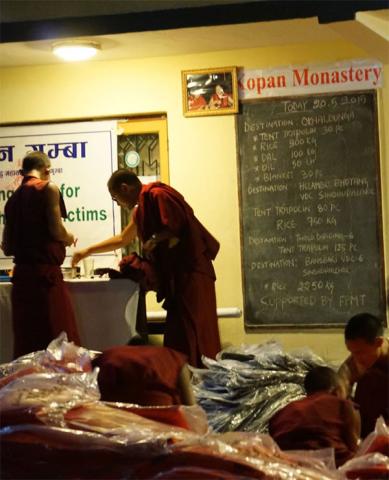
The crisis continues in Nepal, as aftershocks and a second earthquake have increased the devastation. FPMT have been continuing to post regular updates from Nepal on their website.
Our friends at EST WST Collective have been working on the front lines to deliver goods and services to those affected by the quake. Check out their Facebook page for updates and ways you can help. You can also continue to read first-hand reports and view pictures on the Kopan Monastery school Facebook page
You can read Lama Zopa Rinpoche's advice on practices to do after earthquakes on the FPMT website and of course there is the Nepal Earthquake Support Fund set up by FPMT which is helping so many. Please lend your support if you can.
NEWS FROM THE HOME OFFICE: FLOWER OFFERINGS

The Lama Yeshe Wisdom Archive lives on property that was much loved and cared for by the original owners. Their foresight means that there are many, many mature flowering shrubs and trees. As well, since being here, we have added many perennial flowers to beautify the environment. Every single flower that blooms at LYWA we offer with skies of gratitude to Lama Zopa Rinpoche and all the holy gurus, who are the triple gem. We invite you to join in on this offering practice and with that intention we share images of these Spring flowers on our Facebook page. Please enjoy for the benefit of all beings!
As Rinpoche has said in his advice regarding offering practices:
Offering one tiny flower to a statue or picture of Buddha receives immeasurable, limitless, merit. All the paths to happiness result from that. With just one grain of rice or one tiny flower, you can enter the path and achieve total enlightenment—the completion of all good qualities.
Thank you so much to all of you who offer your support to LYWA's mission, and are our partners in our work to make these precious teachings available to everyone in the world in so many ways.
Much love,

Nick Ribush
Director
THIS MONTH'S TEACHING: LIFE IS FULL OF HOPE
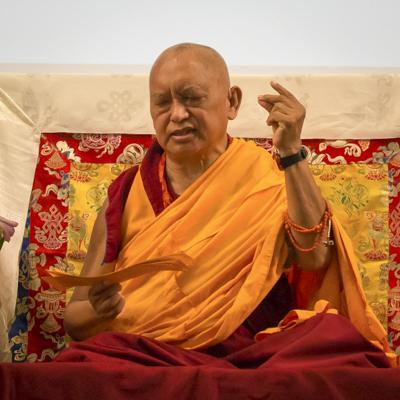
There's a big difference between those who have met Dharma and those who have not met Dharma. By having met Dharma, you are full of inspiration. It's a question of thinking, a question of meditating. Life is full of hope. Rather than feeling very down and hopeless, you feel your life is full of inspiration.
Even if you are experiencing very heavy karma—you are missing limbs or something like that—even if in your mind you want to do something else but due to karma you don't have the freedom to do it now, even if your life is not what you want, even if there is such a big problem, think, "This is temporary. What is happening to me won't last forever. This is a causative phenomenon; it happened in dependence upon cause and conditions. This difficulty in my life happened due to cause and conditions, and due to another cause and conditions it will go away."
No matter how heavy the karma in your life is, no matter how much heavy karma you have created; even if you have created some negative action that means you will be born in the hells for many billions of eons—according to their time, not human time, which is an incredible length of time—don't just be sad about it. Just being sad about any problem or mistake that happens in your life is of no use. Remember your buddha nature, which is pure, which is not oneness with the mistakes. Remember that, and that you have all the potential, all the hope to develop your mind. Remember that you can be better, and then attempt the method to be better.
Of course feeling regret purifies negative actions. The more regret you feel the more negative karma you purify. And, besides feeling regret, think of buddha nature, which is pure, not mixed with the obscurations, with the mistakes, and generate the inspiration to attempt not to commit the negative actions again. Even if you cannot stop the negative actions completely, forever, try to commit them as seldom as possible.
In some cases, stress is even useful. In my point of view, stress is not always negative. There is negative stress and positive stress. For an ordinary person, to have concern or worry helps to get things done in time and done better, whether it is Dharma practice or whatever. So there are benefits. But for a person like me who is very lazy, who doesn't do anything, there is no stress. I'm not saying that I don't have stress, but laziness. Anyway, I don't know what I'm talking about.
So stress is not necessarily negative. I think that whether it's negative stress or positive stress depends a lot on the purpose of your work. If you are doing virtuous actions, being kept busy by that is worthwhile. But if the actions are non-virtuous, done with the three poisonous minds of ignorance, anger or attachment; if you are keeping busy working for those, which means keeping busy doing non-virtuous actions, that becomes negative stress. This is my view.
For example, in order to be healthy, we go to the hospital again and again for check-ups. Why do we go for check-ups? Why do we bother to go for check-ups? Because we want to know if we have any diseases, such as cancer. If we reject the idea of finding out whether we have any disease, it then stops the opportunity for us to be healthy and to have a long life. Not wanting to know that we are sick stops us following treatment, such as taking medicine. In other words, even if we have a disease, we don't want to know that we have it because the idea upsets us. Because of that, we don't go to hospital, we don't have a check-up, so then we don't take the medicine, and then we cannot achieve the benefit of being healthy and having a long life. Rejecting this knowledge is only causing our own failure.
By going to hospital for a check-up, by knowing what disease we have, we can get the right treatment and be cured. This is regarded as a good thing to do, so everybody goes to hospital for check-ups.
It is exactly the same here. In dependence on the virtuous friend or the teachings, we learn to know our mind more, and how much delusion and negative karma we have. We know how our mind makes our actions non-virtuous and the cause of suffering; we know how strong our self-cherishing thought is and how incredibly harmful it is. These are not pleasant things to hear, but it's like the example of checking for disease; if we recognize our disease, we can have better health. Similarly, we recognize that these things don't benefit us, that they have only shortcomings that harm ourselves and others. But there's no use in knowing this and just being upset, being sad. What should we do?
After finding out how strong our selfish mind is and how harmful it is, since it is the root of suffering, we should make the determination not to follow it, to avoid it as much as possible, not only during meditation sessions but in our everyday life. In this way realizing all the mental diseases, self-cherishing thought, negative karma that we have becomes useful. Knowing this makes us purify it, makes us practice bodhicitta more, so it leads us to enlightenment.
When we hear about subjects such as negative karma and self-cherishing thought, it looks as if we are putting ourselves down, thinking, “I am bad, I am doing this and that.” But as I mentioned with the example of the sick person, there's no use in just knowing this and feeling sad. What should be done? We should encourage and inspire ourselves by thinking of buddha nature, which has all the potential. We should attempt to defeat the self-cherishing thought, and to purify negative karma and not create it again. In this way, all happiness, all success, comes to us and to all sentient beings.
Excerpted from a discourse given by Kyabje Lama Zopa Rinpoche in Adelaide, Australia, on August 6, 1991. Edited by Ven. Ailsa Cameron. You can read the entire teaching on our website.
